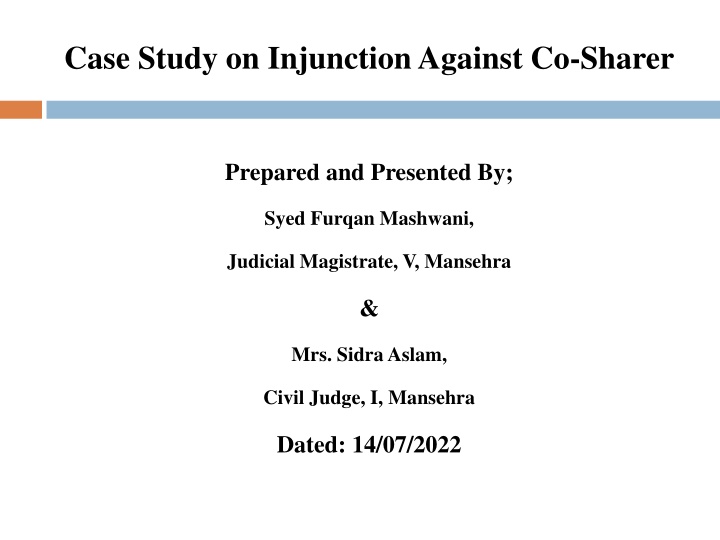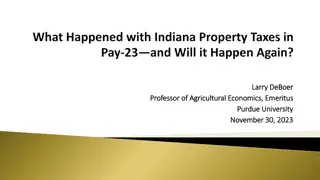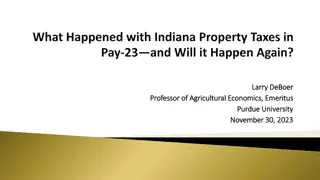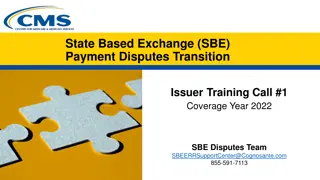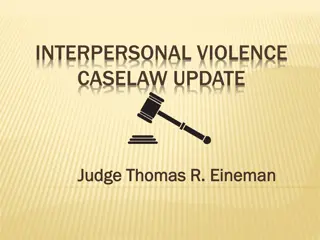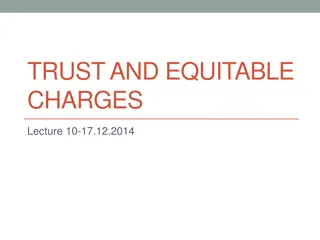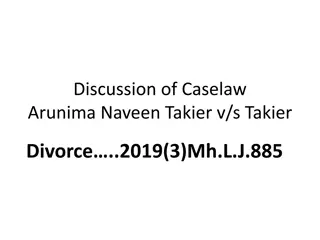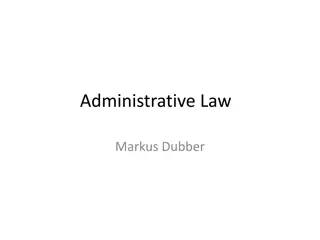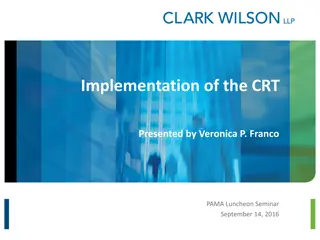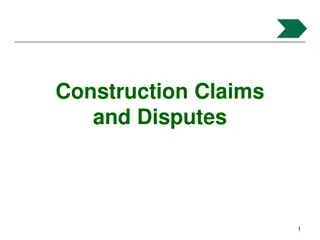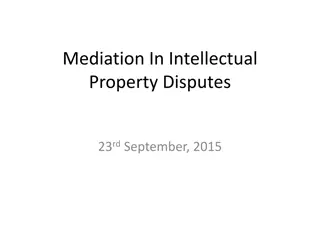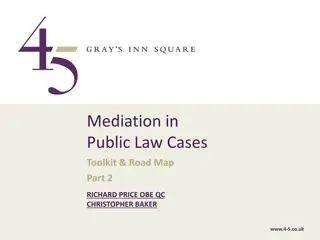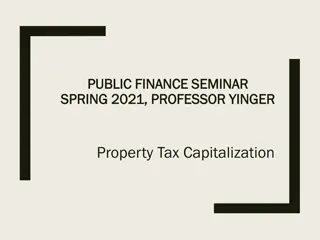Legal Analysis: Injunction Against Co-Sharer in Property Disputes
An injunction is a legal remedy where a party is ordered to refrain from or do a specific act. In property disputes involving co-sharers, the question arises whether injunctive relief can be granted without partition. Two schools of thought exist on this matter, with the first school suggesting that a suit for permanent injunction against a co-sharer is not maintainable without first seeking partition of joint property. Relevant laws, case laws, and the agreed-upon rule regarding co-sharing rights are also discussed.
Download Presentation

Please find below an Image/Link to download the presentation.
The content on the website is provided AS IS for your information and personal use only. It may not be sold, licensed, or shared on other websites without obtaining consent from the author.If you encounter any issues during the download, it is possible that the publisher has removed the file from their server.
You are allowed to download the files provided on this website for personal or commercial use, subject to the condition that they are used lawfully. All files are the property of their respective owners.
The content on the website is provided AS IS for your information and personal use only. It may not be sold, licensed, or shared on other websites without obtaining consent from the author.
E N D
Presentation Transcript
Case Study on Injunction Against Co-Sharer Prepared and Presented By; Syed Furqan Mashwani, Judicial Magistrate, V, Mansehra & Mrs. Sidra Aslam, Civil Judge, I, Mansehra Dated: 14/07/2022
DEFINITION: INJUNCTION: An injunction is a judicial process whereby a party is ordered to be refrained from doing or is directed to do a particular act or thing. CO- SHARER The word co-sharer means a person who retains any fraction of share in property to have or possess or retain share of title or has right to share. [1990 CLC 164]. it signifies persons owing a share or shares in whole of the property or properties of which other sharers are subject to sale. Whatever the interest of co-sharer in the joint property may be, is a co-owner in every inch of that property to the extent of his share until partition takes place which he can claim as a matter of right. [2001 MLD 597].
TYPES OF INJUNCTION: Temporary injunction, I. Permanent injunction and II. Mandatory injunction. III. RELEVANT LAW: Order 39 Rule 1 CPC Section 52 to 57 of the Specific Relief Act, 1877
AGREED UPON RULE : Every co-sharer is entitled to each and every inch of the un-partitioned immoveable property and is deemed to be interested in every inch of subject matter irrespective of quantity of his interest. The only way out for determination of specific shares of a co-sharer is formal partition .
QUESTION? Whether An Injunctive Relief Can Be Granted Against A Co-sharer?
FIRST SCHOOL Suit for permanent Injunction against a co-sharer is not maintainable, except, by brining a suit for partition. If a co- sharer feels himself aggrieved by the action of another co- sharer, his remedy is to go for partition and get his shares separated. Year wise case law favoring this school of thought is listed below:
Case Law: First School PLD 1973 SC 214; [Suit for permanent injunction against other co-sharers is not maintainable except by bringing a suit for partition of joint property]. 1979 CLC 230 Lahore; 1991 MLD 106 Lahore; 1999 SCMR 2325; [Suit for permanent injunction against the other co-sharers is not maintainable except by bringing a suit for partition of joint property]. 2001 MLD 597;
Case Law: First School. 2003 MLD 742 Lahore; [Every co-sharer in possession of joint property to the extent of his share in entire joint property has a right to make use of it in a manner he likes without hindrance by other co-sharers. If co-sharers feel aggrieved by conversion of land by other co-sharer, their remedy is to go for partition and get their share separated.] 2003 MLD 484 Lahore; [Trial court could not pass a decree for specific Khasra number from joint khata, unless joint khata has been partitioned]. 2004 MLD 1844 Lahore; 2004 CLC 995 Lahore; 2006 SCR 17;
Case Law: First School 2006 YLR 856; [Injunction against co-sharer cannot be issued because co-sharer has constructed possession in each inch in the property]. 2007 YLR 1723 Peshawar; 2012 YLR 809 High Court AJ&K; 2014 MLD 1844; 2016 YLR 1300 Lahore; [Co-sharer could not file a suit declaration and possession against other co-sharer but a suit for partition could only be filed].
Case Law: First School 2016 CLC 176 Peshawar by Justice Yahya Afridi; [Each co-owner in an undivided property was presumed to be the owner in possession of each inch of the property. Co-owner of an undivided property seeking injunctive relief, could only seek the same with the formal partition of undivided property. Co-owner seeking partition of the joint property would be able to obtain the determination of the respective share of each co-owner. Granting injunctive relief to one co-owner would amount to authorizing him to legally take possession of a valuable portion of the joint property which would frustrate the partition of joint property]. 2019 SCMR 84; [Latest view of the Supreme Court wherein the view taken in 2016 CLC 176 Peshawar was upheld].
SECOND SCHOOL Every co-sharer has interest in each and every inch of joint property, however no joint owner could change its character without first having joint property partitioned and could not be permitted to alter the character of property without consulting the other co-sharers. Injunction granted. Year wise case law in favor of the second school of thought is listed below:
Case Law: Second School PLD 1959 SC (Pak.) 9; [If strong co-sharer after taking possession of more valuable part of joint property either alienates same or changes its character, then it cannot be said that weak/poor co-sharer may file suit for partition and till its decision, strong co-sharer may alienate same or change its character and throw his adversary into ditches or barren land by taking commercially valuable land on road side or more fertile land-- Such course cannot be allowed under principles of equity and justice]. PLD 1988 SC 1509;
Case Law: Second School 1989 SCMR 130; [Every co-owner in the joint property is interested in each and every inch of the joint ownership and no co-owner can take possession of any specific portion or change its character unless the property is partitioned by metes and bounds]. 1992 SCMR 138; 1995 SCMR 514; [Every co-owner in the joint property is interested in each and every inch of the joint ownership and no co-owner can take possession of any specific portion or change its character unless the property is partitioned by metes and bounds].
Case Law: Second School. 1996 CLC 275; PLD 1998 SC 1509; 1999 CLC 598 SCAJ&K; 1999 CLC 2406; 1999 CLC 964; 2000 CLC 1138 Peshawar; [Co-sharer who is in exclusive possession of a specific portion of a Joint property cannot alienate, transfer or change the same unless a regular partition takes place between the co sharers].
Case Law: Second School 2000 SCMR 780; 2002 CLC 739; 2002 MLD 676; 2003 CLC 1695; 2003 SCMR 999; [Defendants instead of raising construction on the property which was admittedly co-owned by the plaintiffs, should have first of all got the same partitioned and then might have constructed the portion of land falling in their share] 2003 CLC 1695 Lahore; 2004 SCMR 1581; [Co-sharer in joint property can neither make any change in the property without the consent of other co-sharers nor can deal with the joint property in a manner prejudicial the interest of other co-sharer without his permission].
Case Law: Second School 2004 YLR 1136 Lahore; [Each co- sharer was owner in every part of the joint holdings to the extent of his entitlement. No co-sharer could be permitted to change the character of the land the exclusion of other co-sharers, without resorting to some lawful partition proceedings]. 2006 MLD 442; 2008 YLR 2454; 2008 CLC 934; 2009 YLR 2454 High Court AJ&K.; [Every co-sharer had interest in each and every inch of joint property, however no joint owner could change its character without first having joint property partitioned and could not be permitted to alter the character of property without consulting the other co-sharers.]
Case Law: Second School 2011 MLD 1570 2011 MLD 1518; PLD 2012 Islamabad 68; 2012 CLC 1618 2012 CLR 89; [Each co-sharer is owner in each and every inch of the joint Khata, therefore, one co-sharer cannot be allowed to usurp the rights of others in any manner. A permanent injunction can be granted by the court when there is an apprehension of change in the nature of property.]
Case Law: Second School 2016 MLD 1735 Peshawar; 2009 CLC 92 Peshawar; [A co-sharer cannot be allowed to alter the nature of joint land unless it is partitioned]. 2016 YLR 2195 Peshawar; [Proper course for a joint owner is to approach the revenue hierarchy for partition of a particular share. Civil court had ample power to redress the grievances of the owner in possession of the property seeking relief to restrain the other owner of his dispossession from the joint property till the legal partition. Courts below are bound to consider the case of the plaintiff with regard to claim of dispossession from the property.]
PRACTICAL COMPLICATION WITH THE FIRST SCHOOL OF THOUGHT: Actual dispute is between two co-sharers and the one aggrieved approaches the Court. The court knocks him out on the point that both of you are co-owners wherein a suit for injunction is not maintainable except by bringing a suit for partition. Now the party aggrieved has to go for partition with all co-sharers who are not at issue with parties to the suit, thus, resulting into a protracted and expensive litigation.
PRACTICAL COMPLICATION WITH THE SECOND SCHOOL OF THOUGHT: If the court restricts one co-owner from construction/interference in the joint property and passes an injunction/decree. The injunctive order will be followed by an application for appointment of bailiff and enforcement of court order. How is the bailiff going to implement Court s order on the spot where property is joint consisting of hundreds of co-sharers and measuring hundreds of kanals? In case of decree, it is going to followed by an execution petition where the DH will ask the court for implementation of decree which in itself is not executable for the aforementioned reason. If the court moves on to implement its decree, it will ultimately encroach upon the jurisdiction of a Revenue Court in cases of agricultural property. So, why to pass an order which is not executable?
Solution/Our Opinion: SOLUTION NO.1: Do not entertain the suit at all. Directions to approach Revenue Forum. Once revenue forum is approached for partition, then a civil court can grant injunction against a co-sharer for smooth running of partition proceedings. Even if the civil court is not approached for stay or constructions were raised before/during filing of suit, the constructions made will be on the risk and cost of the party doing it and will be subject to final partition of suit property where the party will not be entitled for compensation if found in excess of their shares. In this respect we have sought guidance from [2011 MLD 1548, 2006 MLD 435].
SOLUTION NO.2: Straightaway pass permanent injunction but specify a time frame with directions to plaintiff to go for partition. If partition proceedings aren t initiated in the specific time frame given by the court, then the decree shall lose its legal ground. In this scenario, a civil court can avoid appointment of bailiff and execution petition and will also not be forced to appoint commissions for determination of interference
Thankyou! Now the House is open for valuable input of the fellow colleagues and guidance of the learned Seniors.
